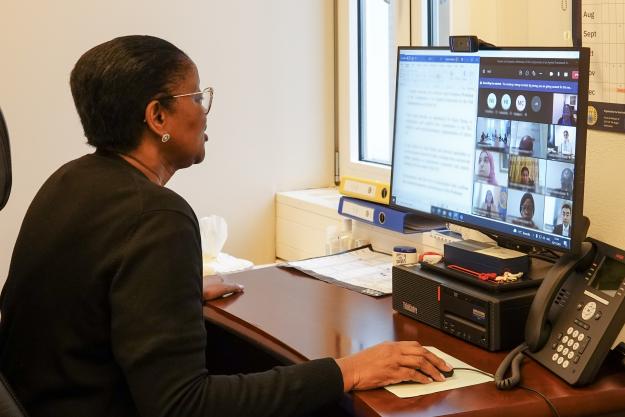The Organisation for the Prohibition of Chemical Weapons (OPCW) Member States yesterday held their annual Review and Evaluation Workshop of the Components of an Agreed Framework for the Full Implementation of Article XI of the Chemical Weapons Convention (CWC).
Already in its sixth edition, the workshop assisted in reviewing activities relating to Article XI of the Convention, which encourages the economic and technological development of States Parties to the CWC. The article envisages free participation in the exchange of chemicals, equipment, and scientific and technical information to ensure chemistry is used exclusively for the benefit of humankind.
Opening the online event, the OPCW Deputy Director-General, H.E. Ambassador Odette Melono, stressed: "Fulfilling the provisions of Article XI remains crucial to boosting national implementation, promoting chemistry for peaceful uses, supporting the exchange of scientific and technological knowledge, and facilitating international cooperation. The OPCW Technical Secretariat remains firmly committed to supporting the needs and requirements of States Parties in this regard. Through these activities and more, the Secretariat also helps to build capacity and the ability of States Parties to prevent the re-emergence of chemical weapons."

The Facilitator of Article XI and the First Secretary of the Permanent Representation of Malaysia to the OPCW, Ms Fadhilah Halimatus Shifa Kusumaningrum, noted in her opening remarks: "The Annual Workshop is designed to facilitate discussion and exchange of views among States Parties and relevant stakeholders to advance the full implementation of Article XI of the CWC. The full, effective, and non-discriminatory implementation of Article XI remains central in keeping the Chemical Weapons Convention relevant and attractive. Programmes designed around the established thematic areas of Article XI have continued to be delivered for States Parties even during the pandemic. Although offered online, the continued interest shows how important Article XI is to all of us."
The workshop discussions focused on the progress and the impact of Article XI programmes and activities in Member States. Ms Shifa Kusumaningrum also briefed attendees on the deliberations resulting from the ideas that emerged from Article XI workshops.
Seventy-nine delegates from Member States, including National Authorities and Permanent Representations to the OPCW, represented the following 48 OPCW Member States: Algeria, Argentina, Bangladesh, Belgium, Brazil, Cambodia, Cameroon, Canada, China, Costa Rica, Cote d'Ivoire, Cuba, Croatia, El Salvador, Ethiopia, Finland, France, Gambia, Georgia, Germany, the Holy See, Honduras, India, Iran, Iraq, Italy, Japan, Kenya, Malaysia, Mexico, Morocco, Myanmar, Nigeria, Pakistan, Paraguay, Peru, Philippines, Poland, Portugal, Romania, Saint Vincent and The Grenadines, Serbia, Slovakia, South Africa, Spain, the State of Palestine, the United Kingdom of Great Britain and Northern Ireland, and the United States of America.
Background
The Review and Evaluation Workshop of the Components of an Agreed Framework for the Full Implementation of Article XI has been designed to support the implementation of the Decision on the Components of an Agreed Framework for the Full Implementation of Article XI of the Chemical Weapons Convention (C 16/DEC.10, dated 1 December 2011). The Decision provides for the measures including capacity building, networking and exchange, and facilitating international exchange and cooperation.
The first workshop on Article XI was held at OPCW headquarters in November 2010, where experts and National Authorities gathered to discuss ways for promoting chemistry for peace and security.
Based on the outcomes of the first workshop, four regional Article XI workshops were convened in Asia, Latin American and Caribbean (GRULAC), Eastern Europe and Africa in 2012 and 2013 to review the needs of Article XI implementation in different regions. A further workshop was organised in 2014 to explore ideas that could help develop concrete measures to fully implement Article XI.
The first Review and Evaluation Workshop for Article XI was organised in 2016. The OPCW Technical Secretariat annually organises the Review and Evaluation Workshop, which provides a platform for OPCW Member States to discuss the implementation of Article XI.
As the implementing body for the Chemical Weapons Convention, the OPCW, with its 193 Member States, oversees the global endeavour to permanently eliminate chemical weapons. Since the Convention's entry into force in 1997, it is the most successful disarmament treaty eliminating an entire class of weapons of mass destruction.
Over 98% of all declared chemical weapon stockpiles have been destroyed under OPCW verification. For its extensive efforts in eliminating chemical weapons, the OPCW received the 2013 Nobel Peace Prize.






